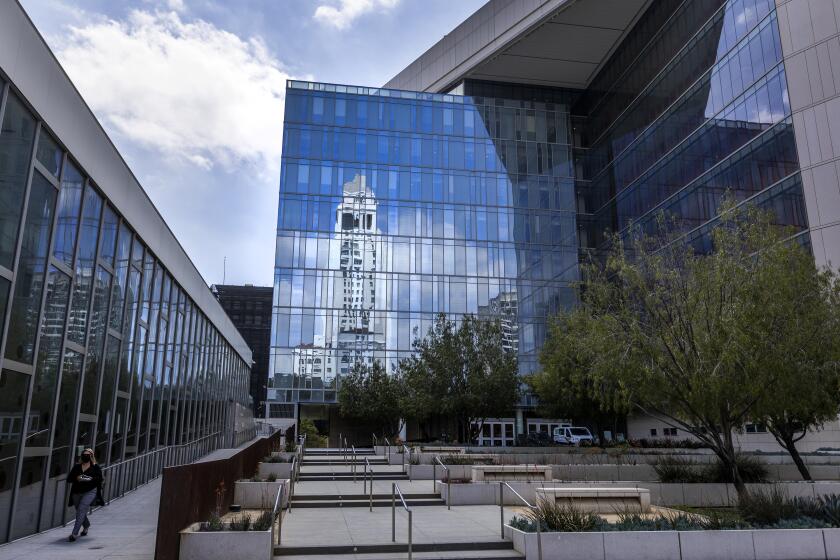Grand Avenue project at turning point
The push to transform downtown’s Grand Avenue into a Champs-Elysees for Los Angeles has faced years of delays and obstacles. The ambitious plan to create a tony cultural destination around the landmark Walt Disney Concert Hall has already been scaled back because of the recession.
Now, with a key deadline set for Monday, the centerpiece of the Grand Avenue project — two towers offering luxury condos, a hotel, and high-end shops and restaurants — is facing another critical test.
In a little-noticed meeting last week, county Supervisor Gloria Molina and other officials unanimously rejected the conceptual plan for the $650-million project, with Molina criticizing the design and saying developer Related Cos. had failed to create an enticing public space that went beyond expensive shops and restaurants.
The move put the long-awaited project in jeopardy, according to alarmed business leaders and government officials. At midnight Monday, an agreement between the authority and Related will expire.
Carol Schatz, president and chief executive of the downtown-based Central City Assn., said she was “shocked and angry” over the committee’s Sept. 23 vote to reject the proposal from Related, which has already committed $120 million to the Grand Avenue effort.
“Coming so close to the deadline for the contract’s ability to move forward, the vote really cast doubt as to whether the project could proceed at all with Related,” Schatz said. “After nine years, that was shocking to hear.”
The Los Angeles Grand Avenue Authority — a panel that includes representatives from the city and the county — voted 3 to 0 last week to reject the developer’s proposal, a key milestone. Officials at the authority and their spokespeople say the vote was merely a rejection of the proposed plan, not of the developer. But according to a report prepared for the committee ahead of its Sept. 23 meeting, any vote to reject the plan is the same as killing the project outright.
If the project falls apart, the county could face major legal liability, notably because of the $50 million that Related put into the expansion and reconstruction of Grand Park, which stretches from the Music Center to City Hall. The developer is already building a residential tower on Grand Avenue as part of the authority’s effort to remake the corridor.
Since the vote, the authority and its staff have moved quickly to get the matter reconsidered — and Related’s agreement extended — before Monday’s midnight deadline. Staffers spent the weekend writing up a report for a new meeting Monday. Three of the four members who sit on the panel are set to participate by phone, including Molina, who will call in from a hotel in Oaxaca, Mexico, where she is on vacation. They will vote not on new plans but on a proposal to extend the agreement for three months.
During last week’s meeting, Molina and county Chief Executive William T Fujioka made clear their displeasure with Related’s proposal. Both said they did not see how it would be a high-caliber project for Grand Avenue, home to the Museum of Contemporary Art, the Frank Gehry-designed Disney Hall and the Broad Museum, which is expected to open in 2014.
Molina, who heads the committee, criticized the proposal’s “boxiness” and complained that one entry facing Grand Avenue lacked “any architectural interest whatsoever.”
“There’s nothing there that lends itself in any aspect to a design that promotes any kind of pedestrian activity, any street activity or anything,” she told the panel. “It is still a continuation to me of the fort-like conditions down Grand Avenue.”
Fujioka, who reports to the five county supervisors, voted with Molina and Steve Valenzuela to reject the plans, saying during the meeting that he was “very, very disappointed” with the presentation. City Councilman Jose Huizar was absent.
The president of the development company said Sunday that he remains committed to the project.
“We have in good faith fulfilled all of our obligations through every step of the process, had multiple meetings on the Conceptual Plan and were therefore surprised and disappointed that it wasn’t approved,” said Bill Witte, president of Related California. “It was in no way a completed design but a concept to be refined in collaboration with the Grand Avenue Authority.”
Since last week’s vote, county officials have struggled to explain what exactly happened and what comes next. On Friday, Molina spokeswoman Roxane Marquez said the panel voted to “remove Related from the Grand Avenue project” but said the panel could change course after seeing new plans Monday.
On Sunday, Molina aide Gerry Hertzberg corrected that statement, saying plans won’t be presented Monday. In addition, he said, the committee “did not vote to terminate” Related’s contract. “If they don’t approve a new agreement … by Sept. 30 then [the] Related contract terminates,” he wrote in an email.
Martha Welborne, former chairwoman of a nonprofit committee that first began promoting the Grand Avenue effort in the early 2000s, said she was “very concerned” by the authority’s action last week.
“This was always seen as the flagship of the project. It’s right across from Disney Hall,” she said. Any further delays mean “a more uncertain future at the top of Bunker Hill and the impact that the project can have.”
Schatz said the authority and Related need to come to terms quickly.
“There is no more time to wait,” she said. “The project must move forward now.”
More to Read
Sign up for Essential California
The most important California stories and recommendations in your inbox every morning.
You may occasionally receive promotional content from the Los Angeles Times.












